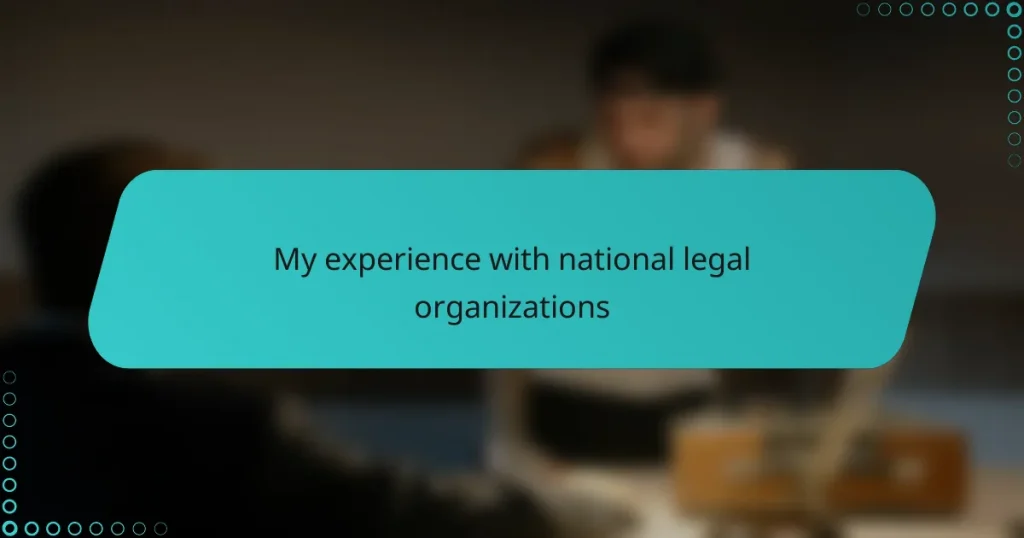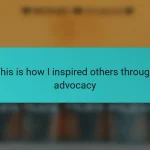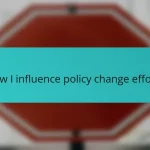Key takeaways
- Legal advocacy blends empathy and assertiveness, focusing on championing rights while maintaining ethical integrity.
- National legal organizations provide essential resources, expertise, and a sense of community, empowering individuals to tackle complex legal issues.
- Collaboration and clear communication are vital, as engaging with legal organizations enhances personal effectiveness and fosters collective impact.
- Patience and humility are crucial for enduring advocacy efforts, emphasizing the importance of listening and continuous learning in the journey for justice.
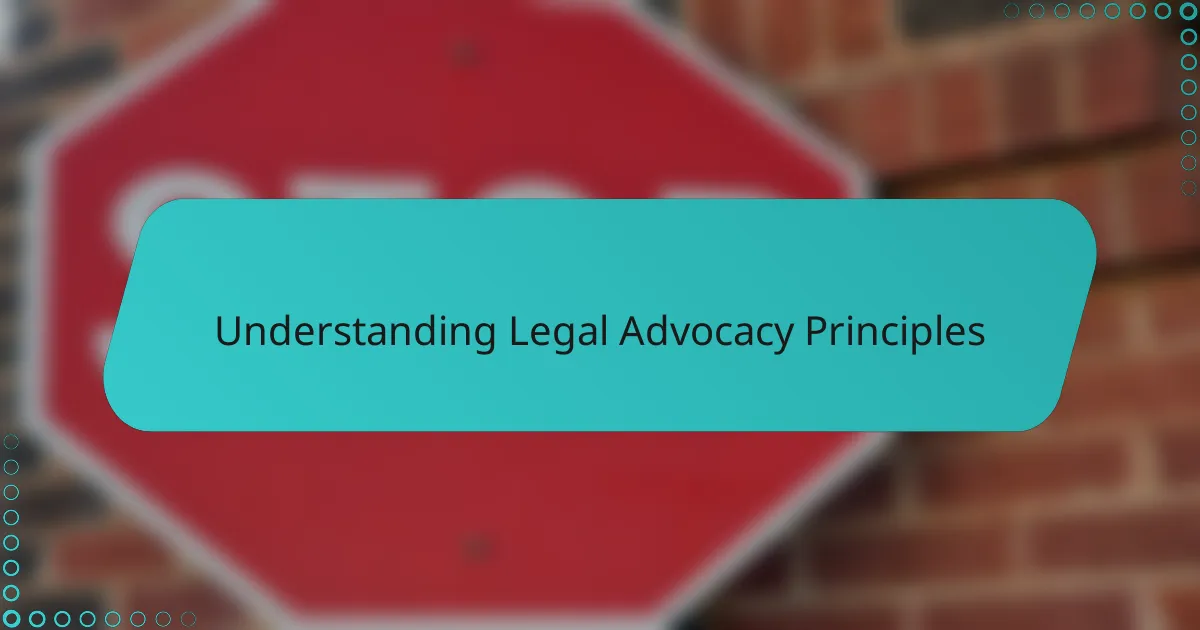
Understanding Legal Advocacy Principles
Legal advocacy, in my experience, is more than just knowing the law; it’s about passionately championing the rights of others. Have you ever wondered what drives someone to stand up against powerful systems? For me, it’s the belief that every voice, no matter how small, deserves to be heard clearly and forcefully.
I recall a moment when understanding the core principles of legal advocacy transformed my approach completely. It’s about strategic communication—knowing when to push, when to listen, and how to present a compelling argument that resonates beyond the courtroom. This balance between empathy and assertiveness is what makes advocacy truly effective.
What strikes me most is the ethical foundation underpinning legal advocacy. It’s not just about winning cases, but advancing justice with integrity and respect. Without these principles, advocacy loses its meaning and becomes just another form of confrontation. Have you ever felt the weight of responsibility that comes with this balance? I certainly have, and it continually shapes how I engage with legal causes.
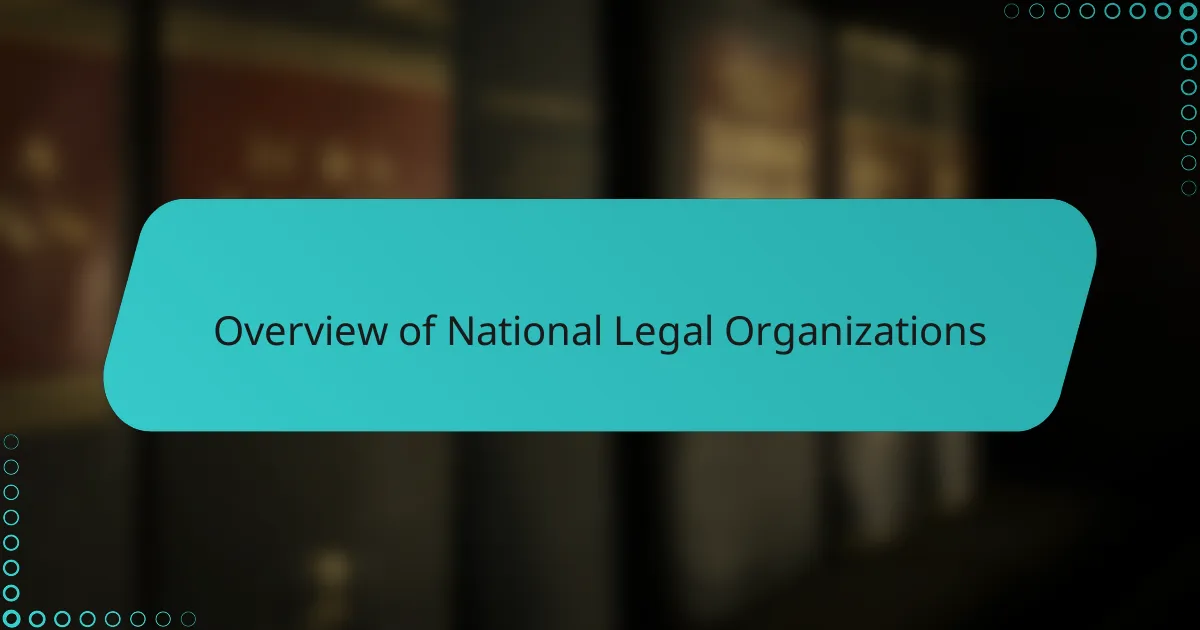
Overview of National Legal Organizations
National legal organizations often serve as the backbone for effective advocacy efforts across the country. From my experience, these groups provide crucial resources, connections, and a unified voice that magnifies individual efforts. Have you ever felt overwhelmed facing a complex legal issue alone? That’s where these organizations step in, offering expertise and support that can make all the difference.
What stands out to me about national legal organizations is their diversity in focus. Some concentrate on civil rights, others on criminal justice reform, while many address specific causes like immigration or disability law. Joining or working alongside these groups revealed how specialized knowledge and coordinated action can create real change over time.
I remember attending a workshop hosted by one such organization that truly shifted my perspective. The level of professionalism combined with passionate advocacy was inspiring. It made me realize that legal advocacy isn’t just about individual battles—it’s about joining a larger movement committed to justice on a national scale. Have you ever experienced that sense of collective purpose? It’s empowering and motivating in equal measure.
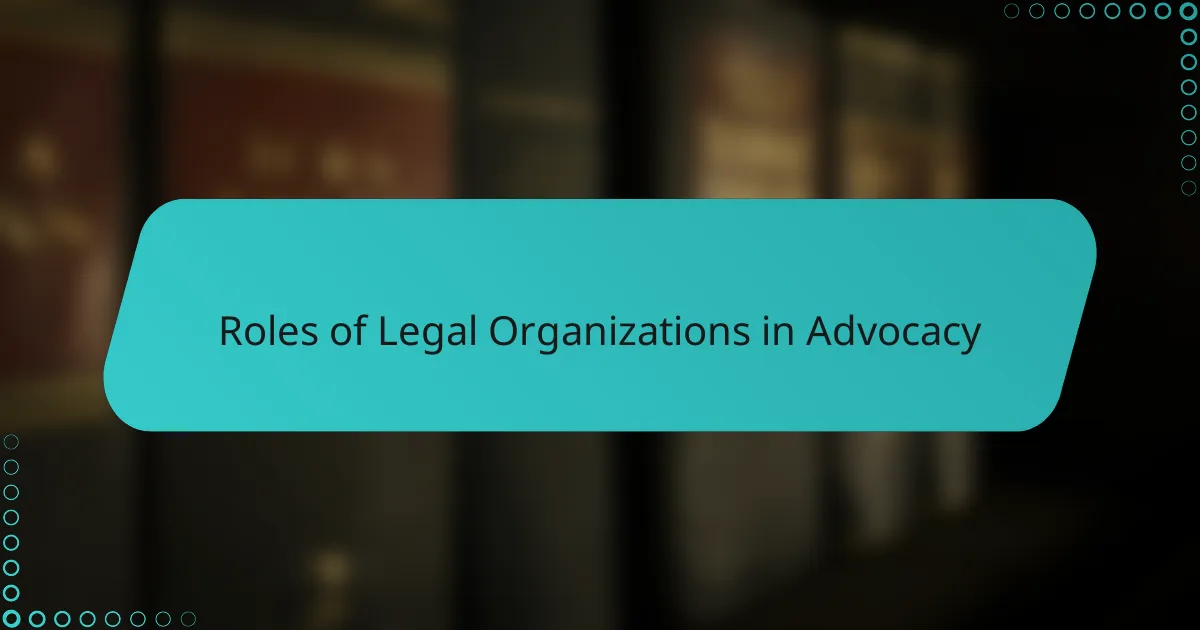
Roles of Legal Organizations in Advocacy
Legal organizations play a critical role in shaping the strategies and goals of advocacy efforts. From what I’ve seen, they don’t just offer legal advice—they serve as hubs for knowledge-sharing and coordinated action that strengthens the fight for justice. Have you ever wondered how a single case can spark widespread reform? Often, it’s because these organizations connect the dots between individual stories and bigger systemic issues.
One thing that struck me about their role is how they balance advocacy with education. It’s not just about winning lawsuits but also about informing the public and policymakers to create lasting change. I recall a campaign led by a national group where they combined legal briefs with community workshops, making the law accessible to everyday people. That mix of empowerment and legal expertise is powerful.
At times, I’ve felt overwhelmed by the complexity of legal challenges, but national organizations often provide a safety net through their networks and resources. They become champions not only in courtrooms but also in shaping policies and attitudes. Have you ever been part of a movement where collective effort amplified your voice? That’s exactly the kind of impact these groups foster, turning individual struggles into shared victories.
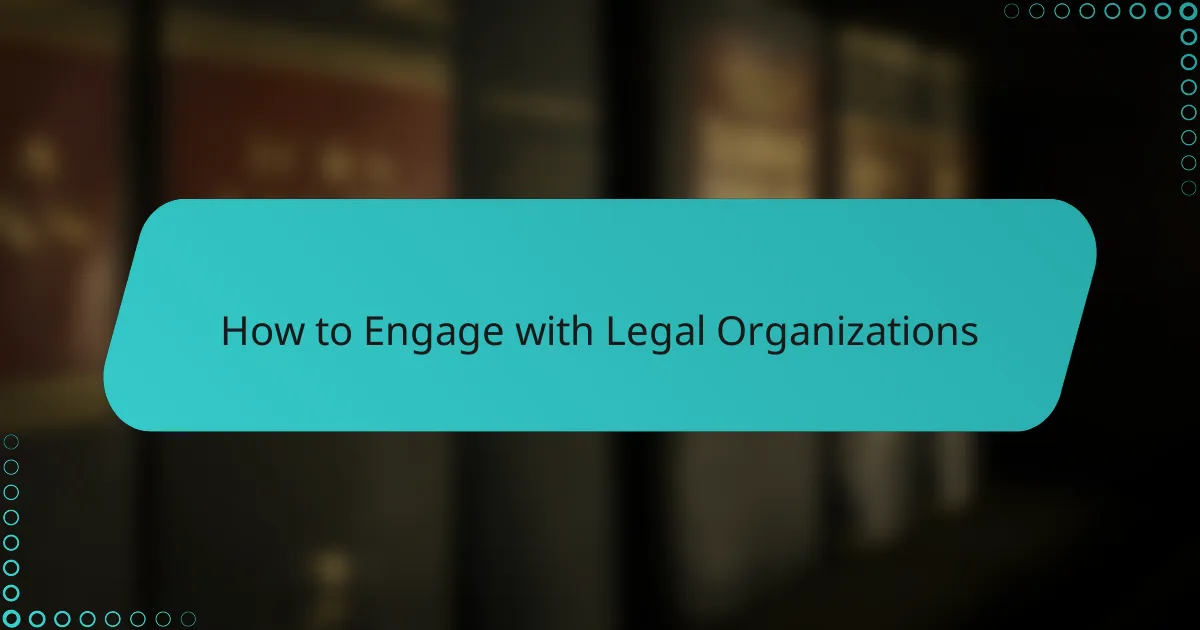
How to Engage with Legal Organizations
Engaging with legal organizations has been one of the most transformative steps in my advocacy journey. At first, I was hesitant to reach out, unsure if my voice would matter amid such large groups. But I quickly learned that these organizations welcome involvement at all levels, whether you’re attending events, volunteering your time, or simply subscribing to their newsletters to stay informed.
One strategy that really worked for me was to actively participate in workshops and training sessions they offer. These aren’t just dry lectures; they provide practical tools and connect you with like-minded advocates who share your passion. Have you ever felt alone in your cause? I found that building relationships this way made me feel supported and more effective in my efforts.
Don’t underestimate the power of communication—reaching out via email, social media, or phone calls can open doors you didn’t expect. I remember sending a simple inquiry to a national organization and being invited to a roundtable discussion shortly after. That moment showed me how approachable and eager these groups are to collaborate with individuals committed to justice. How might your next email lead to a meaningful partnership?
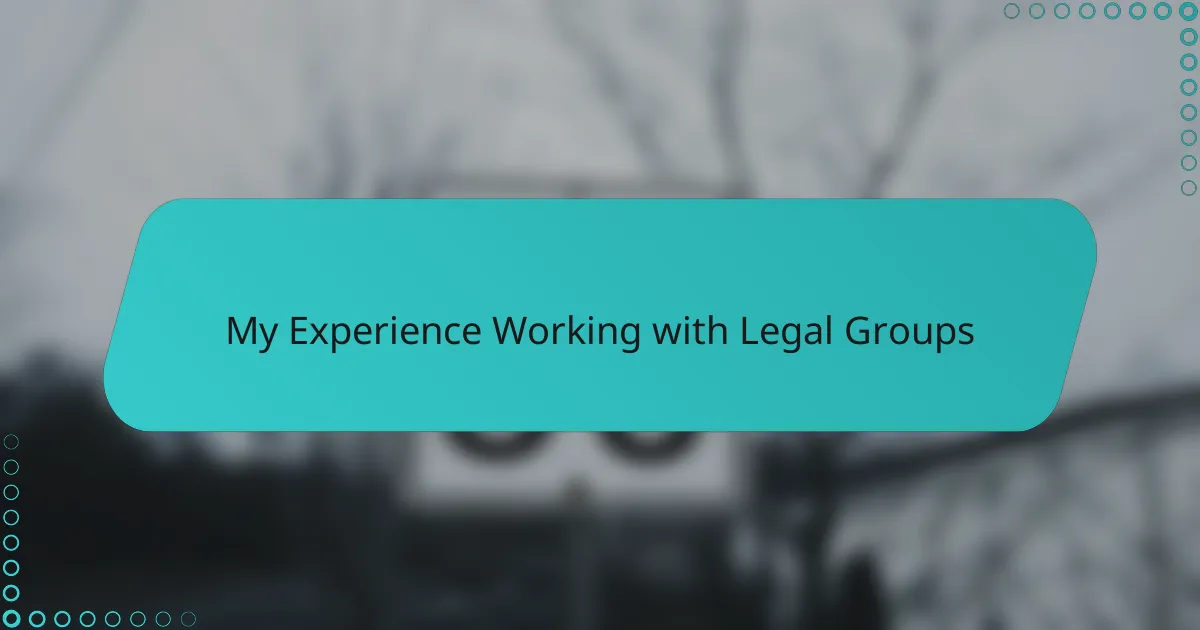
My Experience Working with Legal Groups
Working with national legal groups has opened my eyes to how collaborative and dynamic legal advocacy can truly be. I recall feeling a bit intimidated at first—these organizations often seem vast and formal—but once I got involved, I found a welcoming community eager to share knowledge and support. Have you ever walked into a room full of experts and wondered if you belong? I certainly did, but that feeling quickly faded as I saw the genuine passion everyone brought to the table.
One moment that really stuck with me was when I helped prepare materials for a major campaign alongside one of these groups. Witnessing how everyone’s skill sets fit together to craft a unified message was inspiring. It made me realize that beyond individual efforts, these organizations harness collective power to drive change that no single person could achieve alone. Doesn’t that kind of synergy give you hope about what’s possible in legal advocacy?
At times, navigating different organizations felt overwhelming, especially as I tried to balance multiple commitments. Yet, I discovered that clear communication and asking for guidance went a long way. Reaching out to a mentor within the group once was a turning point—it turned uncertainty into confidence and paved the way for more meaningful involvement. Have you ever found a helping hand in an unexpected place? That experience affirmed for me how vital support networks are in this work.
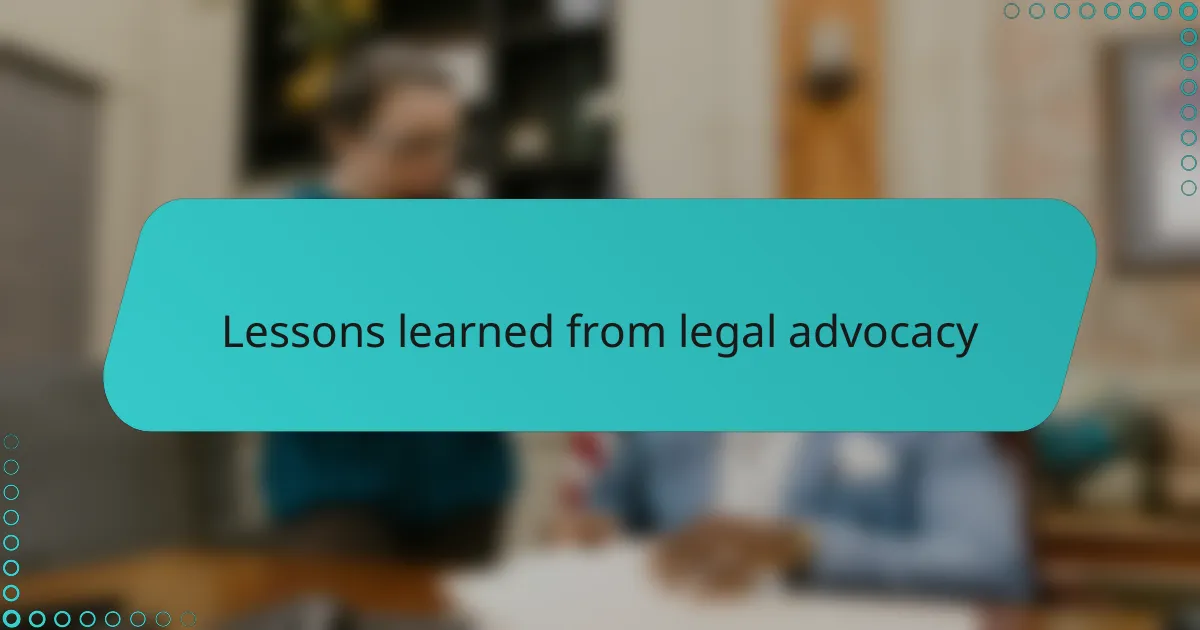
Lessons Learned from Legal Advocacy
What really stood out to me through all my advocacy work is that patience becomes a superpower. Change rarely happens overnight, and I’ve learned to appreciate the slow, steady progress that legal advocacy demands. Have you noticed how persistence often makes the difference between just fighting a battle and winning a lasting victory?
I also came to realize that legal advocacy isn’t just about the law itself—it’s deeply human. Listening to people’s stories shaped my approach far more than any legal textbook ever could. When I allowed myself to connect emotionally with those I was helping, the advocacy felt more authentic and impactful.
Sometimes, the biggest lesson was about humility. No matter how much I prepared, I encountered moments when collaboration and admitting I needed help were crucial. Have you ever been reminded that advocacy is really a team effort? Those times taught me that strength often lies in knowing when to lean on others.
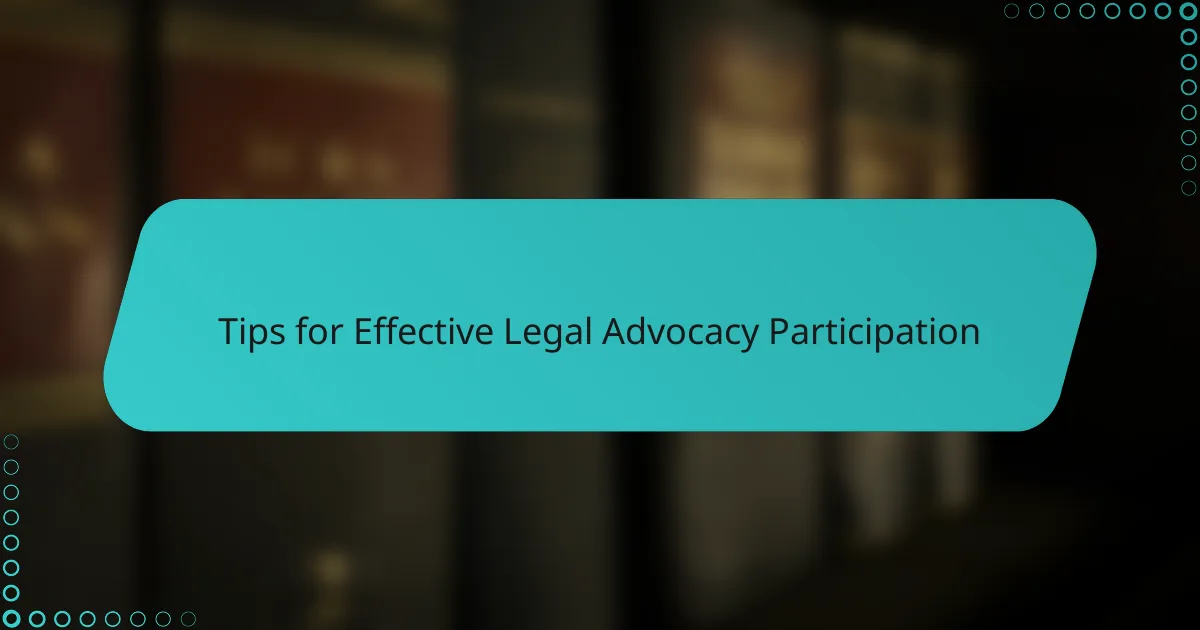
Tips for Effective Legal Advocacy Participation
One tip I always emphasize is to stay informed but also stay curious. Have you ever found yourself lost in legal jargon or overwhelmed by complex policies? I remember early in my advocacy days, simply asking questions and seeking clarifications made a huge difference in how confidently I could participate. Curiosity fuels learning and opens doors you might not expect.
Another strategy that proved invaluable for me was balancing passion with patience. Legal advocacy can feel like a marathon rather than a sprint—have you noticed how quick wins are rare? It took me time to appreciate that steady, consistent involvement often leads to more meaningful impact than bursts of intense effort. That mindset shift helped me stay motivated even when progress seemed slow.
Finally, I can’t stress enough the power of building genuine relationships within these organizations. Have you ever felt isolated when trying to push for change? Joining a community where voices are respected and collaboration is encouraged transformed how effective I could be. Those personal connections not only offer support but also amplify your advocacy in ways you wouldn’t achieve alone.
